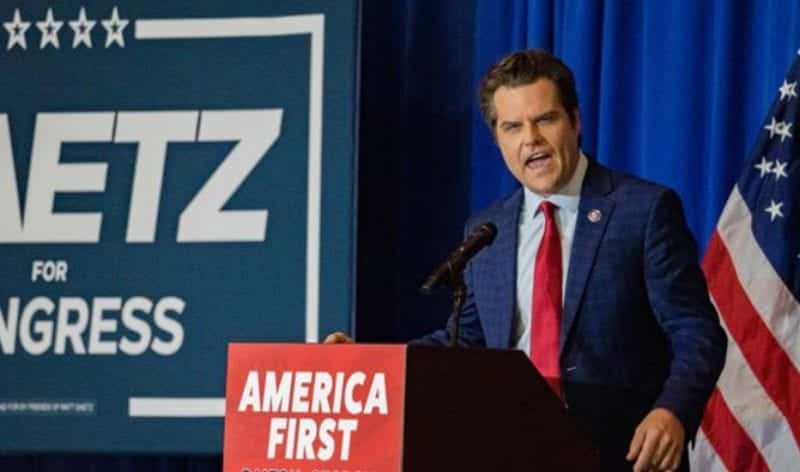
As Trump prepares for his second term, his recent cabinet nominations have sparked significant debate and concern across the political spectrum. Notably, the selections of Tulsi Gabbard as Director of National Intelligence, Matt Gaetz as Attorney General, and Pete Hegseth as Secretary of Defense have been met with widespread criticism.
The unconventional choices reflect a broader strategy by Trump to fill key positions with figures known for loyalty and alignment with his views, regardless of their experience in government.
Tulsi Gabbard: A Controversial Choice for Intelligence Leadership
Tulsi Gabbard, a former Democratic congresswoman from Hawaii, has been nominated to lead the nation’s intelligence community. Gabbard’s political journey has been unconventional; she has shifted from Democratic presidential candidate to a vocal critic of her former party, aligning herself with conservative viewpoints on various issues. Her foreign policy stances, particularly her past support for Syrian President Bashar al-Assad and her skepticism towards U.S. military interventions, have raised eyebrows. Critics argue that her positions may not align with the traditional responsibilities of the Director of National Intelligence, which include providing unbiased assessments of global threats.
Matt Gaetz: Legal Troubles and the Role of Attorney General
Perhaps the most contentious nomination is that of Representative Matt Gaetz for Attorney General. Gaetz, a staunch Trump ally, has been embroiled in legal controversies, including a House Ethics Committee investigation into allegations of sexual misconduct. While Gaetz has denied any wrongdoing, the ongoing investigations cast a shadow over his suitability for the nation’s top law enforcement position. Legal experts and political analysts express concern that his appointment could undermine the integrity of the Department of Justice and erode public trust in its impartiality.
Pete Hegseth: Fox News Host and Conspiracy Theorist for Secretary of Defense
Among the most surprising picks is that of Pete Hegseth, co-host of Fox & Friends Weekend, who has been nominated for Secretary of Defense. A former Army National Guard officer, Hegseth is known for his outspoken support of Trump and his role as a media personality on Fox News, where he has promoted controversial and often conspiracy-laden views. Hegseth’s frequent critiques of the Pentagon’s “political correctness” and his vocal opposition to military restraint have won him favor among Trump’s most ardent supporters, but his lack of experience in managing a complex military bureaucracy and absence of high-level defense strategy experience have led critics to question his qualifications.
Hegseth has a history of promoting unverified and often inflammatory claims on his show, which align with Trump’s approach to foreign and domestic policy. His nomination has caused particular unease in defense circles, with many military experts worried about the implications of his untested leadership style on national security.
Loyalty Over Experience: A Recurring Theme
These nominations reflect a broader pattern in Trump’s selection process: prioritizing personal loyalty over traditional qualifications. Other notable appointments include Senator Marco Rubio as Secretary of State, a role in which his foreign policy experience provides some stability. However, the addition of Hegseth alongside Gaetz and Gabbard raises questions about the administration’s commitment to expertise and the potential implications for national security and governance.
Potential Constitutional Challenges
The controversial nature of these appointments sets the stage for potential constitutional confrontations. If the Senate, which holds the power to confirm cabinet nominees, rejects these picks, Trump may resort to recess appointments to bypass the confirmation process. Such a move could lead to legal battles and further political polarization, challenging the checks and balances that underpin the U.S. government.
Implications for U.S. Allies and Global Relations
The international community is closely monitoring these developments. Gabbard’s nomination, given her past foreign policy positions, may cause unease among U.S. allies, particularly in Europe and the Middle East. Gaetz’s appointment could also impact international law enforcement collaborations, as foreign partners may question the stability and direction of the U.S. Department of Justice under his leadership. Similarly, Hegseth’s nomination as Secretary of Defense has raised concerns about the United States’ approach to defense alliances, given his lack of experience in international military strategy and his tendency to promote isolationist and often conspiratorial viewpoints.
Conclusion
President-elect Trump’s recent cabinet nominations have ignited a firestorm of debate, highlighting the tension between loyalty and expertise in governance. As these nominees face the Senate confirmation process, the nation watches closely, aware that the outcomes will shape the trajectory of U.S. domestic and foreign policy in the coming years.
